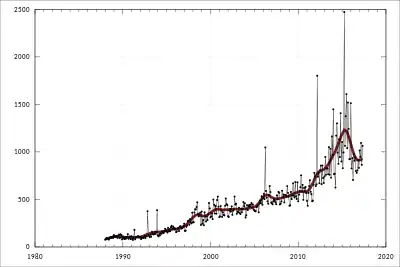Australia–Korea Free Trade Agreement
The Korea–Australia Free Trade Agreement (also called the KAFTA) is a bilateral agreement seeking to reduce trade and investment barriers between Australia and South Korea. The agreement was finalised and came into force in 2014. Australia and South Korea have a strong and complementary trading relationship.


The agreement
Australian Trade Minister Andrew Robb and Korean Trade Minister Yoon Sang-jick, concluded negotiations on the Agreement in early December 2013 and the legally verified text of the agreement was initialed by Chief Negotiators on 10 February 2014.[1] In April 2014, the Australian Prime Minister Tony Abbott led a trade delegation to Japan, South Korea and China. The three economies accounted for more than half of all of Australia's two-way trade.[2] On the South Korean leg of the mission, Abbott signed the Australia Korea Free Trade Agreement (KAFTA) with the government of Park Geun-hye in Seoul on 8 April.[3] The agreement came into force on 12 December 2014.[4]
According to Australia's Department of Foreign Affairs and Trade, Australia and Korea have "one of the strongest and most complementary trading relationships in the Asia-Pacific region. The Korea-Australia Free Trade Agreement (KAFTA) reduces trade and investment barriers, making it easier for Australians to do business with Korea – our 4th largest trading partner."[5]
References
- Department of Foreign Affairs and Trade, About the Korea-Australia FTA, Australian Government
- Kennedy, Mark (11 April 2014). "Abbott in China shows skills beyond his years". The Sydney Morning Herald. Fairfax Media. Archived from the original on 15 May 2014.
- "Australia signs free trade agreement with South Korea in Seoul". ABC News. Australian Broadcasting Corporation. 8 April 2014. Archived from the original on 1 November 2016.
- Robb, Andrew (3 December 2014). "Robb announces Korea FTA to take effect in 9 days" (Press release). Archived from the original on 25 December 2014.
- KAFTA – a snapshot Archived 14 July 2014 at the Wayback Machine; DFAT